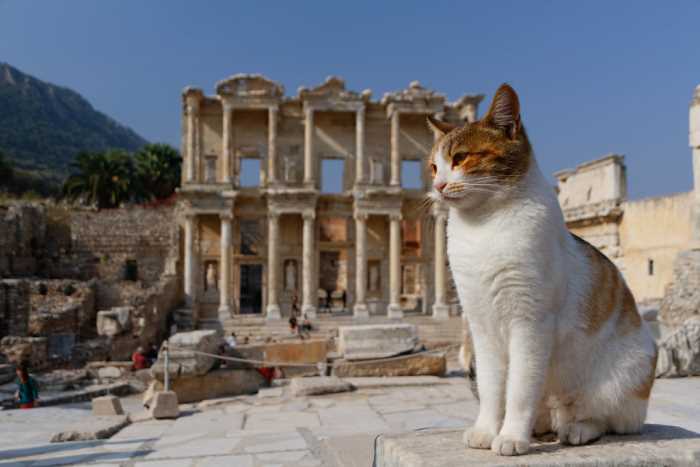The Library of Celsus in Ephesus was a magnificent ancient Roman building that served as a library, mausoleum, and tomb for the Roman senator Tiberius Julius Celsus Polemaeanus. The library was built in the 2nd century AD and is considered one of the most impressive examples of Roman architecture in the world.
History and Details of Celsus Library in Ephesus, Turkey
Library of Celsus in Ephesus is one of the most beautiful works of the Roman period, located in the Ephesus Ruins in Turkey. Celsus Library is the work of the famous Roman architect Vitruoya. The Library of Celsus was built in 135.
As we know, Celsus left 25,000 denarius for the construction of the library and acquiring book for the library. 25,000 Denarius values around 1.65 million USD today. This calculation was made considering a Roman workday was 6 hours and a basic worker was paid a denarius for a day’s work.
The library was built on the slope of a hill in the city of Ephesus, which was an important port city in the Roman Empire. It was constructed using marble and decorated with ornate carvings and statues. The exterior of the building was adorned with four statues representing the virtues of wisdom, knowledge, intelligence, and valor.
The interior of the library was divided into three levels. The main reading room was located on the first floor, and it was here that the scrolls were kept. The second level used as a lecture hall, where scholars and students could listen to lectures and engage in discussions. The third level used as a storage area for the scrolls.
The Library of Celsus was a place of learning and knowledge, and it was a popular destination for scholars and intellectuals from all over the Roman Empire. It is believed that the library held over 12,000 scrolls, making it one of the largest libraries in the ancient world. The scrolls contained a wide variety of knowledge, including literature, philosophy, science, and more.
In addition to its function as a library, the Library of Celsus was also a mausoleum and tomb for Tiberius Julius Celsus Polemaeanus. Celsus was a wealthy Roman senator who lived in the 2nd century AD. He was a patron of the arts and a great supporter of education.
Upon his death, his family built the Library of Celsus as a monument to his memory and as a place where his remains could be interred. Celsus’ tomb is located under the western wall of the library. It was used as both a library and a mausoleum during its period. The statue of Celsus in the place where his grave is located is in the Istanbul Archeology Museum.
The Library of Celsus was destroyed in the 7th century AD by an earthquake, and its remains lay buried until the 20th century. In the 1960s, archaeologists began excavating the site and found the remains of the library, which were then restored and made open to the public. The Celsus Library was unearthed during the excavations carried out in 1905, and in 1970 it was restored to its former appearance by the architect Friedmund Hueber and the Archaeologist Volker Michael Strocka. Today, the Library of Celsus is a popular tourist destination in Ephesus and is a testament to the incredible achievements of the ancient Romans.
The most interesting information about the Celsus library is the rumor that there is a secret tunnel between it and the brothel opposite. It is stated that this tunnel, which is said to be under the marble street between the library and the brothel, allowed important names of the period and some people who did not want to be seen in the brothel to enter the brothel secretly.
Governor Julius Celsus Polemaenus
The library was built in the name of the late Ephesus Governor Julius Celsus Polemaenus. It was founded by his son Julius Aguila. The tomb of Celsus is located under the western wall of the library. It was used both as a library and as a mausoleum during its period. The statue of Celsus’s grave is located in the Istanbul Archeology Museum today. Some even speculate that Celsus wanted a library in the city center of Ephesus but after being declined, he decided to build a library to gain a place for his mausoleum.
The architecture of Celsus Library
Celsus Library consists of a single hall that is 15 meters high. Actually, the library has three floors, although it looks like two floors from the outside. The restoration was made between 1970 and 1980. They did not have paper books back in those days, instead, they were using parchment paper which was made out of calfskin. The library had an additional wall, creating proper protection from moisture getting inside and tainting parchment paper.
There are four statues in front of the Library of Celsus. They represent four virtues of governor Celsus: Sophia (Wisdom), Arete (Bravery), Episteme (Knowledge), and Ennoia (Thought).
The Celsus Library hosted the training of scientists and thinkers of the time. Celsus library is a must-see in any Ephesus tour. I liked to spend some time there with my guests and take some memorable photos of them.
Reconstruction Work at the Celsus Library Started on 25th of September 2024
A new reconstruction work at the Celsus Library started on 25th of September 2024. Recent research at the library showed that library has some micro cracks and damages which can be resulted in much bigger damages in the close future. This new construction work supposed to take place for several months and library will gain its old strength again.
A Tour Guide For The Celsus Library
You can write to me to learn more about the Library of Celsus in Ephesus, or You can book a tour of Ephesus to see the library and more. See you soon, Hasan Gülday.

Thanks for your kind words!